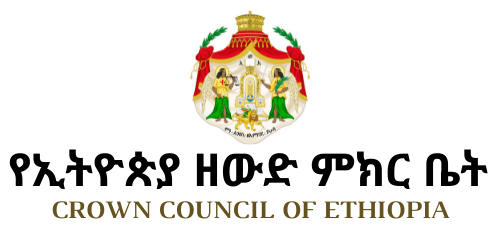A Statement by His Imperial Highness Prince Ermias Sahle-Selassie Haile-Selassie, President of the Crown Council of Ethiopia, Washington, DC
The recent activities by some respected Ethiopian Religious Leaders and others to plea for the pardon and the release of the former Derg (Military Officials) officials came as dismaying and perplexing news. It goes without saying that forgiveness and atonement are the moral duty of all of us, but equally adherence to our laws makes society function impartially and fairly. We each have a duty to be forgiving but not forgetting as we strive to uphold the law.
These former military rulers were found guilty by the Ethiopian Supreme Court in 2007, for the crimes of genocide, war crimes, and crimes against humanity. There are also many leaders and functionaries of the same regime who as yet have escaped justice by having fled the country and are presently living in exile in different parts of the world.
To grant forgiveness without the presence of atonement does not help the healing of a brutalized society. It should never be forgotten that it was the same regime which without hesitation or the slightest pretext for justice murdered and maimed thousands of Ethiopians. It was a regime that boasted the immaculate keeping of records of those it killed and tortured. It is the same regime that traumatized a whole generation of Ethiopians, and forced many to flee their beloved country.
Ironically, it was the same government that persecuted all religion, and ordered the murder of the late Defender of the Faith, Emperor Haile-Selassie I and the Patriarch of the Ethiopian Orthodox Church, Abune Tewfelos. To this day, countless Ethiopian families have not been able to account for their loved ones, who were buried hastily in secret graves throughout their country.
By any account this may be described as one of the darkest chapters of human history, especially that of Ethiopia.
The Ethiopian Courts took impressive measures to bring evidence and wit-nesses in convicting those who are charged. In fact, because of the painstaking work involved to implement the weight of these charges, the same courts were criticized for the amount of time it took to convict those charged. To the victims often it seemed that to this day “justice delayed is justice denied”.
The Judiciary is one of the main pillars of our Constitution. The Law should be paramount as it seeks to protect the rights of the individual and the collective.
The Law has passed judgment and its verdict should be carried out. The famous Holocaust survivor Simon Wiesenthal once stated that “Justice for crimes against humanity must have no limitation”. The Ethiopian Courts should also pursue those who as yet have not had their day in court. Why to this day the International Courts have not as yet indicted the brutal dictator, Mengistu Haile-Mariam, and his other henchmen, remains a mystery.
It is important to ask also why the former officials who pleaded “not guilty” or have not expressed any remorse in the past twenty years are now asking for forgiveness.
In terms of the law, pardons are a way to correct faults left unaddressed by the judicial process. They offer a second chance to people wrongly convicted or disproportionately punished. This certainly is not the case with the former officials. There should be no reason why these former officials cannot atone for their sins by serving the terms and sentences imposed on them by law, while understanding that their atonement is their part of the healing of forgiveness which the sufferers grant to them.








